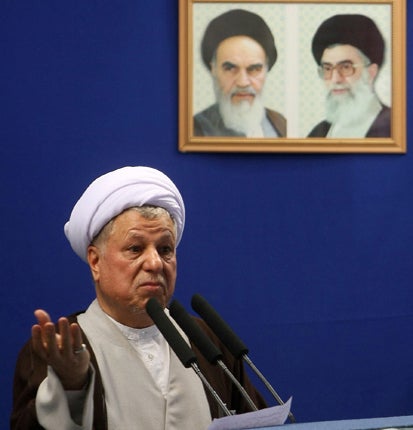Rafsanjani calls on Iran to release protesters
Influential cleric's sermon issues challenge to Supreme Leader and President

Your support helps us to tell the story
From reproductive rights to climate change to Big Tech, The Independent is on the ground when the story is developing. Whether it's investigating the financials of Elon Musk's pro-Trump PAC or producing our latest documentary, 'The A Word', which shines a light on the American women fighting for reproductive rights, we know how important it is to parse out the facts from the messaging.
At such a critical moment in US history, we need reporters on the ground. Your donation allows us to keep sending journalists to speak to both sides of the story.
The Independent is trusted by Americans across the entire political spectrum. And unlike many other quality news outlets, we choose not to lock Americans out of our reporting and analysis with paywalls. We believe quality journalism should be available to everyone, paid for by those who can afford it.
Your support makes all the difference.The political crisis over Iran's disputed election has flared up once again as the powerful cleric Akbar Hashemi Rafsanjani delivered a sermon criticising the repression of protesters claiming the poll was rigged.
Police fired tear gas as tens of thousands of government opponents chanted "Freedom, freedom" and "Ahmadinejad, resign, resign" while they listened to the sermon in the prayer hall of Tehran University.
Sitting in the front row was Mirhossein Mousavi, the defeated opposition presidential candidate, in his first official public appearance since the June vote. The third-placed candidate, Mehdi Karroubi, also attended the Friday prayers, but was attacked by men in civilian dress who knocked off his turban.
"I hope with this sermon we can pass through this period of hardships that can be called a crisis," said Mr Rafsanjani, leading prayers for the first time since the poll. "Doubt has been created [about the election results]. There is a large portion of the wise people who say they have doubts. We need to take action to remove this doubt."
His words were a clear sign that the Iranian leadership is still divided by what has happened in the wake of the 12 June election. The criticism by the former president and influential cleric, particularly the designation of a "crisis", will make it difficult for the authorities to quash all forms of dissent.
The sermon may mark the coming together of a powerful bloc opposing the re-elected President Mahmoud Ahmadinejad and by implication the Supreme Leader Ayatollah Ali Khamenei. Mr Rafsanjani did not directly challenge them, but his words will undermine the crackdown on protesters, who have been branded enemies of the state egged on and supported by foreign powers such as the US and Britain. Even during the prayers a prominent women's rights activist, Shadi Sadr, was beaten by militiamen, forced into a car and driven away.
"It is not necessary for us to have a number of people in prison. We should allow them to return to their families," said Mr Rafsanjani. "It is not necessary for us to pressure the media. We should allow them to work freely within the law."
Again Mr Rafsanjani's seniority within the Iranian political elite will make it more difficult to demonise the opponents of Mr Ahmadinejad. He also spoke of splits within the clergy and that those most revered, the Maraje'e-taghlid, or sources of emulation, had not backed the re-elected president.
A main theme of the speech was a call for unity and at no point did he criticise Ayatollah Ali Khamenei, his long-time rival, who came out in full support for the election result and denounced those alleging vote-rigging. But the sermon is still a powerful challenge to the Supreme Leader since it criticised everything that he has done over the past six weeks.
Such a sermon in such a venue would normally be broadcast on state television which has cameras permanently in position at the university. But yesterday Iranians could only catch the sermon by listening to it on radio.
Many of those attending the Friday prayer meeting wore green bands round their heads or arms, the colour of Mousavi supporters in the election. Others wore green bandanas over their faces outside the hall as they scuffled with police. At least 15 people were arrested, according to witnesses.
Moderate though Mr Rafsanjani's words may have been, the crowd was more belligerent, chanting "Death to the dictator", as well as "Death to Russia" and "Death to China", both of whom recognised the outcome of the presidential election.
Until the sermon yesterday the government seemed to be regaining the initiative as the street protests and shouting of slogans from roof tops was visibly running out of steam. But the crisis will regain momentum as it has become evident that the opponents of Mr Ahmadinejad include a large part of the clerical establishment. What is not clear is what steps each side will now take.
Join our commenting forum
Join thought-provoking conversations, follow other Independent readers and see their replies
Comments